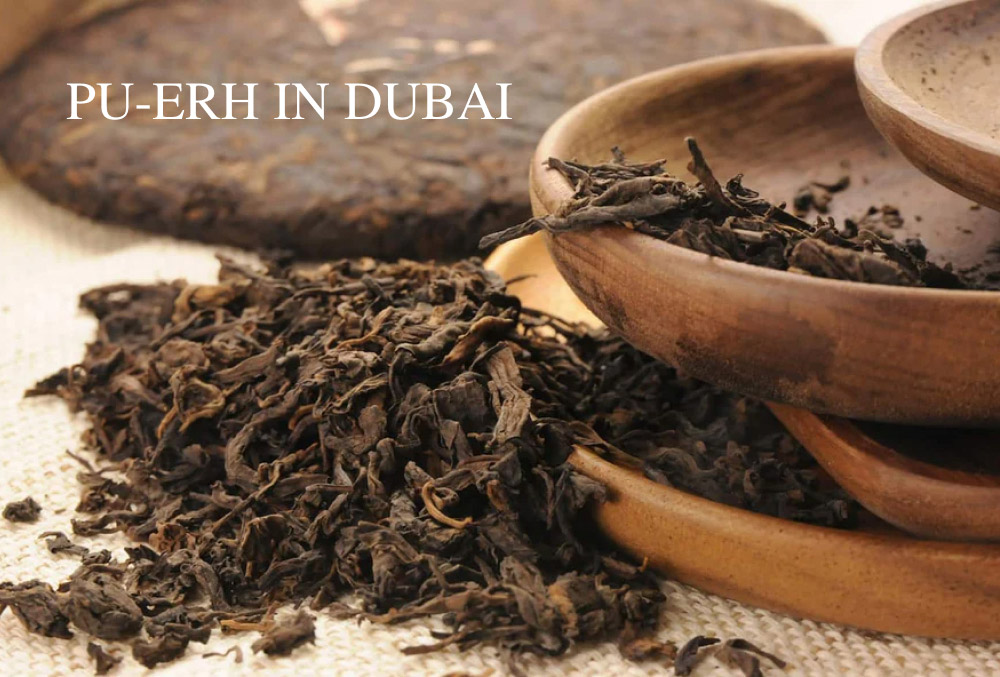Pu-erh in Dubai: What is a Tea and Where to Buy?
April 10, 2025

Pu-erh (普洱茶) is a fermented tea from Yunnan Province, China, available in Dubai in two main forms: Sheng (raw) and Shu (aged). In the UAE, it is sold both loose and pressed (cakes, bricks, mini-dots).
Assortment in Dubai
Shu Pu-erh
The dominant type in the Emirates market. Available in specialty stores, tea boutiques and online. Key characteristics:
- taste: earthy, woody, without bitterness;
- aftertaste: soft, with mineral notes;
- suitable brands: Dayi, Xiaguan, Haiwan (rarely - limited editions).
Most often sold in pressed form - pancakes weighing from 100 g to 357 g. Some sellers (including Cantata and TeaBreak Boutique) pack the tea manually in 50-100 g batches for trial purchases.
Sheng Pu-erh
A rarity. Found mainly among private collectors and boutiques that work with orders directly from Yunnan. Distinguished by:
- taste: tart, with a pronounced fruity-herbal sourness;
- aroma: fresh, sometimes with notes of camphor;
- aging potential - 10+ years.
Connoisseurs in Dubai order young Sheng batches (aged from 1 to 5 years), and then store them at controlled humidity (60-70%) and temperature (23-25 °C).
Pricing
Average retail price:
- Shu Pu-erh: 80–150 AED per 100 g;
- Sheng Pu-erh: 120–300 AED per 100 g (depending on age and origin);
- Collectible cakes: from 400 to 2000 AED per unit.
The premium segment includes rare pu-erhs, such as “7542” from Menghai or “Xiao Fa” from Xiaguan, offered both in boutiques and through private tea clubs.
Retail outlets
- Cantata.ae — flavored and classic pu-erhs, delivered from China. Weight from 50 g, delivery throughout the UAE is possible.
- TeaBreak Boutique (Dubai Mall) — works directly with Chinese factories. Has samples and pressed cakes.
- Dragon Mart — budget varieties. Suitable for everyday use, not recommended for storage.
- Amazon.ae / Noon — unstable assortment, requires checking the origin and freshness of the goods.
Storage methods
Pu-erh in Dubai requires compliance with a number of conditions:
- avoid air conditioning;
- do not store near flavored teas;
- use ceramic jars, preferably without airtight lids;
- maintain humidity at 60-65% and avoid direct sunlight.
Some collectors equip separate humidor boxes for pu-erh, similar to wine storage.
Brewing
Recommended parameters:
| Type | Temp. water | Quantity | Time | Repeated brews |
|---|---|---|---|---|
| Shu Pu-erh | 98–100°C | 5–7 g | 10–30 sec | 7–10 |
| Sheng Pu-erh | 90–95°C | 4–6 g | 10–20 sec | up to 12 |
Methods used:
- Gaiwan — for connoisseurs and tastings;
- Yixing teapot — ideal for daily use;
- French press / strainer — acceptable for Shu in office conditions.
Serving and pairings
Pu-erh is not served with milk in Dubai. Optimal gastronomic pairings:
- dried dates, figs;
- unsalted nuts;
- soft-textured cheeses (brie, camembert);
- 70–85% dark chocolate.
In premium restaurants it is served as part of the tea menu, including in the form of a tea dessert (for example, puer infused with cream, with chocolate mousse).
Audience
Major consumer groups in the UAE:
- Chinese diaspora - especially Sheng;
- Europeans and Russian-speakers - more often buy Shu for evening relaxation;
- Collectors and wellness consumers - consider puer as a health and investment product.
